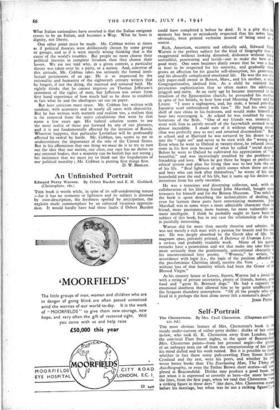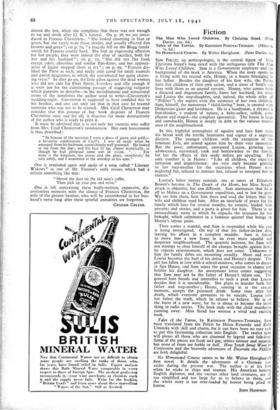Self-Portrait
The Chesterton. By Mrs. Cecil Chesterton. (Chapman an I2S. 6d.)
THE most obvious feature of Mrs. Chesterton's book is steady under-current of rather petty dislike : dislike of her sista in-law, who took G. K. Chesterton away from London, fr the convivial Fleet Street nights, to the quiet of Beaconsfield (Mrs. Chesterton paints—from her personal angle—the pic of an unhappy man cut off from the companionship of his peer his mind dulled and his work ruined. But it is possible to don whether in fact those noisy pub-crawling Fleet Street frien Crosland and the rest, were his peers, and whether he e wrote better books than The Everlasting Man, The Thing Autobiography, or even the Father Brown short stories—all co pleted at Beaconsfield. Dislike may produce a good book, not when it is expressed so covertly as here—the sneer betty the lines, from the first page, when we read that Chesterton " a striking figure in those days " (the days, Mrs. Chesterton m before his marriage, but when was he not a striking figure? almost the last, when she complains that there was not enough to eat and drink after G. K.'s funeral. On p. 26 we are intro- duced to Frances Chesterton: " She looked charming in blue or green, but she rarely wore those shades, and usually effected dim browns and greys "; on p. 70, " a tragedy fell on the Blogg family which hit Frances cruelly hard. She had an engrossing affection for her people; they were indeed the altar of sacrifice, both for her and her husband " ; on p. 72, " She did not like food, except cakes, chocolate and similar flim-flams, and her appreci- ation of liquor stopped short at tea " ; on p. 69, " Frances dis- liked the Press as such, and really only cared for small journals and parish magazines, to which she contributed her quite charm- ing verse." So they go on, the little gibes against the dead woman who did not care for Fleet Street, harmless and silly enough if it were not for the culminating passage of staggering vulgarity which purports to describe—in the melodiamatic and sensational terms of the novelettes the author used to write—Chesterton's wedding-night. Chesterton is supposed to have confided this to his brother, and one can only say that in that case he trusted someone who was not to be trusted. Mrs. Cecil Chesterton may consider that this passage of her book disposes of Frances Chesterton once and for all; it disposes far more destructively of the author who is ready to print it.
It must be admitted that it is not only her enemies who suffer from Mrs. Cecil Chesterton's tastelessness. Her own honeymoon is thus described :
" In honour of the occasion I wore a dress of green and gold,— a favourite combination of Cecil's. I was all ready when he emerged from his bedroom, astonishingly well groomed. He looked at me from the door, and his face lit up, almost ecstatically, as
though he had glimpsed some sort of vision. . . For mine is the kingdom, the power and the glory, sweetheart,' he said softly, and I wondered at the worship in his eyes."
One is reminded again and again of a song called " Literary Widows" in one of Mr. Farjeon's early revues which had a refrain something like this :
" Shovel the dust on the old man's coffin, Then pick up your pen and write."
One is left contrasting these badly-written, expansive, dis- cretionless memoirs with the silence of Frances Chesterton, the wife of the greater brother, who will be remembered in her hus- band's verse long after these spiteful anecdotes are forgotten.
GRAHAM GREENE.


























 Previous page
Previous page